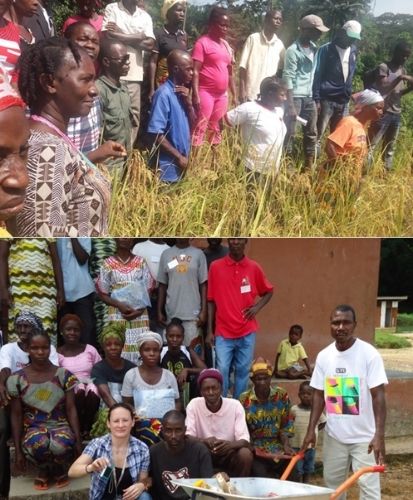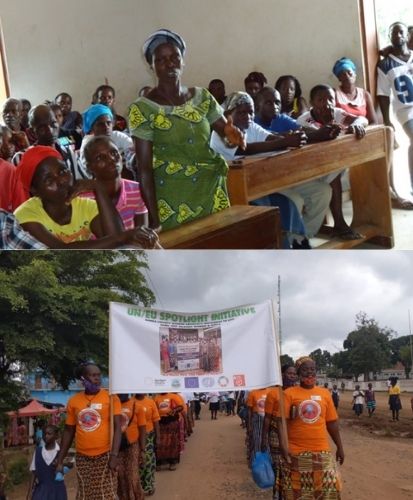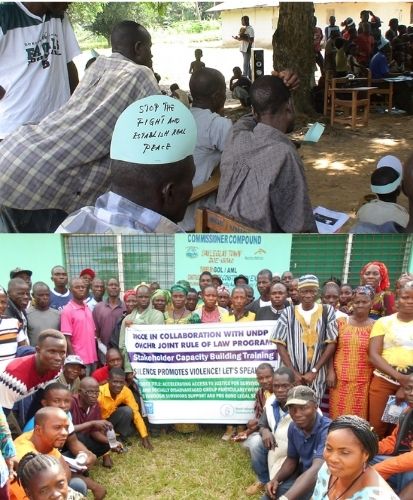Core Programmes
Food Security and Livelihood Development
Across the Liberia, thousands of people depend on agriculture for their livelihood. A major challenge for farmers is the lack of access to finance, tools and seeds which impedes their productivity. To feed the growing population which continuously increasing -Liberia needs to boost agricultural production

RICCE is playing a critical role in strengthening food security, especially around communities where farm land has been converted into protected areas for biodiversity conservation and community land has been given into concession agreements to boost government economic development strategy.
We combine investments with advice to find innovative solutions to expand access to finance for farmers and agribusinesses, supply tools, seeds, improve agriculture productivity, and help community adopt better environmental and social practices. AcelorMittal Liberia biodiversity program (AML) is providing support to affected communities around the East Nimba Nature Reserve (ENNR) through it implementing partner RICCE to carry on these project activities since 2013- present
Gender Equality and Women Empowerment
Gender bias is still deeply embedded in cultures, economies, political and social institutions in Liberia even with the record of a Female President. Women and girls face unacceptable levels of discrimination and abuse, which is not only wrong but also, prevents them from playing a full part in society and decision-making. Women empowerment is crucial to achieving Sustainable Development Goals.

RICCE works for the elimination of discrimination against women and girls, empowerment of women, and achievement of equality between women and men as partners and beneficiaries of development, human rights, humanitarian action, and peace and security.
The vital role of women and the need for their full and equal participation and leadership in all areas of sustainable development According to statistics about 75% of the Ebola deaths were women, however, the different stakeholders’ groups were established both at national and local levels grossly excluded women. We thought there was a need for women’s representation to bring to the table issues that affect women.
RICCE was funded by the African Women Development Fund (AWDF) and facilitated the establishment of Women Task Force Ebola in four communities in Margibi County. , This group was linked with the National Task Force on a support arm providing contact tracing, awareness, and community cleanup exercise.
This women group has transitioned to a community sanitation and surveillance group and providing information to the County health
RICCE worked with the Women NGOs Network of Liberia (WONGOSOL), a network of women organizations to advocate for laws that protect women’s rights (domestic violence Act, affirmative bill, etc.
Environmental Safety, Sustainable Natural Resource Management and Biodiversity Conservation
Farming depends on biodiversity. It’s vital for pollination – more than a third of the world’s agricultural crops depend on pollination by bees and insects. We need to help farmers become more productive, and help to protect and improve the biodiversity around their fields.

We believe that the preservation of biological diversity ecosystem and natural places is critically important to the survival of us all including people, plants, animals, etc. In addition, to the intrinsic value of nature and wildlife, biological diversity and healthy ecosystems provide humankind with many of the things that sustain our lives including clean air and water, fertile soil, a stable climate, food, medicines, materials and technologies, and a diversity of genes and species – not to mention recreational opportunities and natural beauty.
RICCE builds partnership with rural forest-dependent communities in Liberia and helps them identify, evaluate, and prioritize conservation and natural resource management. In each of our projects, we work with communities to get them what they need to restore and conserve the forest ecosystems where they live and on which they rely for basic livelihood and well-being. Our work with our partners can include skills, financing, materials, access to decision-makers and experts, hands-on experience, and other forms of support.
Under our biodiversity program RICCE work with farmers in seven communities along with the East Nimba Nature Reserve with funding from ArcelorMittal Mining Company to promote lowland farming and conservation agriculture to reduce deforestation from traditional shifting cultivation slash and burn farming practice.
We believe that the people who live near or in a threatened ecosystem are those who are best positioned to repair and protect that system for the long term.
Rural Income Generation
Limited access to income opportunities is a major challenge to farmers, especially women to increase their productivity. This has increased poverty and hunger among women and youths in rural communities.

Youth constitute 60% of Liberia’s population; high unemployment among youth is a source of insecurity RICCE has been working with World Bank through LACE to provide temporary employment and live skilled training for vulnerable youths, it is usually said, “An idle mind is the workshop of the devil”.
Our temporary employment opportunity for young people and women has reduced some of the insecurities issues including arm robbery, violent demonstrations, and drug addiction, and provided social protection for thousands of vulnerable youth and women.
The project also designed an integrated life skill training package that involves basic civic responsibilities, contribution to self-development, personal hygiene, small business management, etc. The training facilitated by trained and experienced master trainers transformed many youths and women and help to build their self-esteem and self-confidence in rural communities.
Our Village Savings and Loan Association ( VSLA) programs also provide financial opportunity to loan scheme that is accessible, affordable for local farmers especially women and youth to improve business through friendly loan service. The VSLA program also provides a development fund through a social fund contributed by members of the VSLA groups. The social fund caters to insurance services for its members,
Peacebuilding and Conflict Reconciliation
The Liberian Civil War ended in 2003, but the scars of that conflict remain visible to this day. Despite international non-governmental organizations and government agencies' efforts to empower peacebuilding and reconciliation in Liberia, there remain tribal and political tensions in some parts of rural Liberia.

Peacebuilding and reconciliation in rural Liberia is a complex process that has been affected by the country’s civil war and the Ebola crisis.
The Liberian government and international partners have been working to rebuild peace and reconciliation, but there still remains a lot of work to be done.
The objectives of our peacebuilding and reconciliation programme are to prevent and manage conflicts at the national and community levels. We hope to achieve through a) strengthening the capacity of relevant governmental and peacebuilding agencies, b) enhancing sustainable peacebuilding practices in rural and urban communities, c) enhancing citizen participation in peacebuilding, d) developing a comprehensive national violence prevention strategy, etc.
We have extensively worked across several communities to accelerate access to justice, increase women participation, settle long standing tribal and political conflicts in rural communities , etc.
Facilitation and Capacity Building
Liberian NGOs are often under resourced, understaffed and unable to meet the needs of their communities. This is because many Liberian NGOS lack the capacity to deliver on their mission. This same capacity issues also faced by governmental entities working with development NGOs

The goal of the project is to build the capacity of Liberian NGOs by providing them with technical assistance and training in order for them to be able to better serve their communities.
Liberia has a huge need for facilitation and capacity building. It plays an integral part in Liberia’s socio-economic development and helps vulnerable and marginalized groups to become more employable and contribute to society.
This programme is designed to provide facilitation and capacity-building supports to organizations and individuals in Liberia that support the development intervention we are working on.